-
ORIGINAL ARTICLE12-13-2024
Nurses’ experience regarding patient safety in mobile pre-hospital care
Revista Brasileira de Enfermagem. 2024;77(5):e20230529
Abstract
ORIGINAL ARTICLENurses’ experience regarding patient safety in mobile pre-hospital care
Revista Brasileira de Enfermagem. 2024;77(5):e20230529
DOI 10.1590/0034-7167-2023-0529
Views0See moreABSTRACT
Objectives:
to understand nurses’ experience regarding patient safety in mobile pre-hospital care.
Method:
a qualitative, exploratory and descriptive study, conducted with nurses active in mobile pre-hospital care services. Semi-structured interviews were conducted, audio-graved and submitted to Bardin’s content analysis.
Results:
from four thematic categories established, nurses reported the care and management skills necessary to work in this service. They demonstrated a commitment to ensuring safe care for patients, staff and spectators. They highlighted the actions taken to prevent and mitigate incidents. However, they based their experiences on practice protocols and individual actions, expressing the need to improve knowledge about patient safety.
Final Considerations:
mobile pre-hospital care nurses’ experience in relation to patient safety was limited, suggesting the need for training on the subject, alignment of work processes and implementation of strategies, aiming to guarantee safe care.
-
ORIGINAL ARTICLE12-13-2024
Repercussions of the pandemic on tuberculosis control actions from the perspective of health professionals
Revista Brasileira de Enfermagem. 2024;77(5):e20230477
Abstract
ORIGINAL ARTICLERepercussions of the pandemic on tuberculosis control actions from the perspective of health professionals
Revista Brasileira de Enfermagem. 2024;77(5):e20230477
DOI 10.1590/0034-7167-2023-0477
Views0See moreABSTRACT
Objectives:
to analyze the repercussions of the COVID-19 pandemic on tuberculosis control actions from the perspective of primary health care professionals.
Methods:
this descriptive study with a qualitative approach was conducted from November 2022 to April 2023, using semi-structured interviews with 11 key informant professionals from primary health care units in a Brazilian capital. Data were organized using Atlas.ti 22.0 software and subjected to thematic-categorical content analysis.
Results:
the pandemic scenario caused alterations in the work process, necessitating abrupt adaptations, and led to detrimental impacts on the health of professionals and tuberculosis control actions, which were reduced or discontinued.
Final Considerations:
there was evident unpreparedness and a lack of resources from various governmental levels and health services to handle the public health emergency situation without severe harm to the provision of essential services.
-
12-13-2024
Training of Brazilian indigenous nurses: between human rights, valuing diversity and inclusion
Revista Brasileira de Enfermagem. 2024;77(5):e20230430
Abstract
Training of Brazilian indigenous nurses: between human rights, valuing diversity and inclusion
Revista Brasileira de Enfermagem. 2024;77(5):e20230430
DOI 10.1590/0034-7167-2023-0430
Views0See moreABSTRACT
Objectives:
to analyze the possibilities and potential of training indigenous nurses, given the Brazilian Health System (SUS), understanding the relationships between education and health.
Methods:
theoretical-reflective study, based on scientific literature, aligned with the experience, critical thinking of its authors and the Sustainable Development Goals in Brazil.
Results:
this text articulates three axes: Potential for including indigenous students in nursing training; Paths to achieving equity through inclusion and retention policies for indigenous students at different levels; and Implications of this for the SUS and global health.
Final Considerations:
indigenous students, beneficiaries of affirmative actions, face challenges of inclusion and retention in public universities that directly impact their academic training. Added to this are the difficulties identified in basic education, professor training and implementation of permanence policies, with consequences for services and training at other levels.
-
ORIGINAL ARTICLE12-13-2024
Interobserver agreement in Reception and Risk Stratification in Obstetrics implementation
Revista Brasileira de Enfermagem. 2024;77(5):e20230361
Abstract
ORIGINAL ARTICLEInterobserver agreement in Reception and Risk Stratification in Obstetrics implementation
Revista Brasileira de Enfermagem. 2024;77(5):e20230361
DOI 10.1590/0034-7167-2023-0361
Views0See moreABSTRACT
Objectives:
to analyze interobserver agreement in the Reception and Risk Stratification in Obstetrics protocol implementation.
Methods:
a cross-sectional study carried out during Reception and Risk Stratification in Obstetrics implementation, conducted in a tertiary hospital in southern Brazil with 891 participants in January 2020. Descriptive and interobserver agreement analysis was carried out using the Kappa coefficient in the risk stratification assigned by the triage nurse and reviewed by the researcher.
Results:
around half of the calls (55.6%) were stratified as not very urgent (green), followed by urgent (yellow) (31.8%), very urgent (orange) (9.3%), not urgent (blue) (3.4%) and no emerging stratification (red). Agreement analysis of revised stratification found Kappa values of 0.20 (blue), 0.54 (green), 0.77 (yellow) and 0.80 (orange).
Conclusions:
most appointments were non-urgent. The agreement analysis between the revised and assigned risk stratification revealed greater interobserver agreement as the priority level increased.
-
ORIGINAL ARTICLE12-13-2024
Adaptation and implementation of a Nursing care protocol for children in the Amazon Region
Revista Brasileira de Enfermagem. 2024;77(5):e20230245
Abstract
ORIGINAL ARTICLEAdaptation and implementation of a Nursing care protocol for children in the Amazon Region
Revista Brasileira de Enfermagem. 2024;77(5):e20230245
DOI 10.1590/0034-7167-2023-0245
Views0See moreABSTRACT
Objectives:
to describe the process of implementing an adapted protocol for pediatric nursing care in a health unit located in a municipality in the Amazon Region.
Methods:
methodological research conducted in a basic health unit with four family health teams in the state of Rondônia, involving seven nursing professionals. Data collection occurred between October 2020 and April 2022, following the research phases: situational diagnosis, exploratory phase, protocol definition, implementation, and evaluation.
Results:
the outcome was the adaptation and implementation of a nursing care protocol for children.
Final Considerations:
the adaptation and implementation process can be an effective approach to improving care, strengthening nursing as a profession with a solid foundation in scientific and clinical evidence. This facilitates early problem identification and appropriate guidance, leading to better health outcomes for children.
-
ORIGINAL ARTICLE12-13-2024
Nurses’ experiences in caring for people with mental health problems hospitalized due to clinical comorbidities
Revista Brasileira de Enfermagem. 2024;77(5):e20230136
Abstract
ORIGINAL ARTICLENurses’ experiences in caring for people with mental health problems hospitalized due to clinical comorbidities
Revista Brasileira de Enfermagem. 2024;77(5):e20230136
DOI 10.1590/0034-7167-2023-0136
Views0See moreABSTRACT
Objectives:
to understand nurses’ experiences in caring for people with mental health problems hospitalized due to clinical comorbidities in non-psychiatric Inpatient Units.
Methods:
qualitative study, guided by Alfred Schutz’s social phenomenology. Sixteen phenomenological interviews were conducted. The content was analyzed and discussed based on the literature, through the composition of three categories of analysis.
Results:
three categories emerged in the study: Challenges in care faced by nurses; Fragmented care action; and Ideal care. The disarticulation of the clinic was revealed, as described by nurses, showing care as an action far removed from the comprehensiveness of a person. Nurses’ performance is guided predominantly by biomedical reference, disregarding appreciation of subjectivity.
Final Considerations:
it was observed that nurses attribute the responsibility for patient care to factors external to their life-world, when, in fact, these aspects should be components that help them in comprehensive care construction.
-
REVIEW11-29-2024
Assessment of knowledge in oncology about care for transgender people: a scoping review
Revista Brasileira de Enfermagem. 2024;77:e20230532
Abstract
REVIEWAssessment of knowledge in oncology about care for transgender people: a scoping review
Revista Brasileira de Enfermagem. 2024;77:e20230532
DOI 10.1590/0034-7167-2023-0532
Views0See moreABSTRACT
Objective:
to identify evidence available in the literature on instruments and methodologies used to assess healthcare professionals’ knowledge about cancer care for the transgender population.
Methods:
a scoping review was conducted in seven databases, including studies that answered the question: what is the healthcare professionals’ level of knowledge about cancer care for the transgender population?
Results:
forty-one articles were selected that dealt specifically with healthcare professionals’knowledge in relation to care for the LGBTQIAPN+ population, especially the transgender population. Eighteen studies assessed patients’ perceptions of professionals’knowledge, whereas other studies used their own assessment tools, considering the global context of LGBTQIAPN+ health.
Conclusions:
there is no tested and validated instrument that assesses the knowledge about the transgender population’s oncological health, highlighting the need to construct and validate an instrument focused on this population’s needs.

-
ORIGINAL ARTICLE11-29-2024
Sleep quality of vulnerable elderly people: associated factors
Revista Brasileira de Enfermagem. 2024;77:e20230283
Abstract
ORIGINAL ARTICLESleep quality of vulnerable elderly people: associated factors
Revista Brasileira de Enfermagem. 2024;77:e20230283
DOI 10.1590/0034-7167-2023-0283
Views0See moreABSTRACT
Objective:
To identify factors associated with poor sleep quality in elderly dependent individuals in social vulnerability.
Method:
Cross-sectional study with 59 elderly dependent individuals assisted by Family Health Units in São Carlos/SP. The following tools were used: Katz Index, Lawton and Brody Scale, Pittsburgh Sleep Quality Index, Addenbrooke’s Cognitive Examination Revised, Fried’s Frailty Phenotype, Geriatric Depression Scale (15 items), Perceived Stress Scale, Family APGAR, Social Support Scale from the Medical Outcomes Study, and World Health Organization Quality of Life, abbreviated and “old” versions.
Results:
The majority of participants were women (52.5%), aged 60-74 years (71.1%), and had poor sleep quality (76.2%). Stress (OR=1.12; 95%CI=1.02-1.22) and polypharmacy (OR=7.39; 95%CI=1.22-44.73) increased the chances of poor sleep quality, while physical activity decreased these chances (OR=0.15; 95%CI=0.02-0.79).
Conclusion:
Stress and polypharmacy are associated with poor sleep quality in elderly dependent individuals.
-
ORIGINAL ARTICLE08-07-2023
Perception of Portuguese nurses: clinical supervision and quality indicators in nursing care
Revista Brasileira de Enfermagem. 2023;76(3):e20220656
Abstract
ORIGINAL ARTICLEPerception of Portuguese nurses: clinical supervision and quality indicators in nursing care
Revista Brasileira de Enfermagem. 2023;76(3):e20220656
DOI 10.1590/0034-7167-2022-0656
Views0See moreABSTRACT
Objectives:
to describe nurses’ perception of the influence of clinical supervision on improving quality indicators in nursing care.
Methods:
exploratory research with a qualitative approach, carried out with 16 nurses using the focus group. Data processing emerged from lexicographical textual analysis, resorting to Descending Hierarchical Classification and similarity analysis.
Results:
80.0% retention of 185 text segments with six-class construction. The words were represented by four graphs (supervisor, audit, care, and process); and three subgraphs (implementation, sharing and knowledge).
Final Considerations:
in the perception of nurses, supervision influences quality indicators in nursing care.
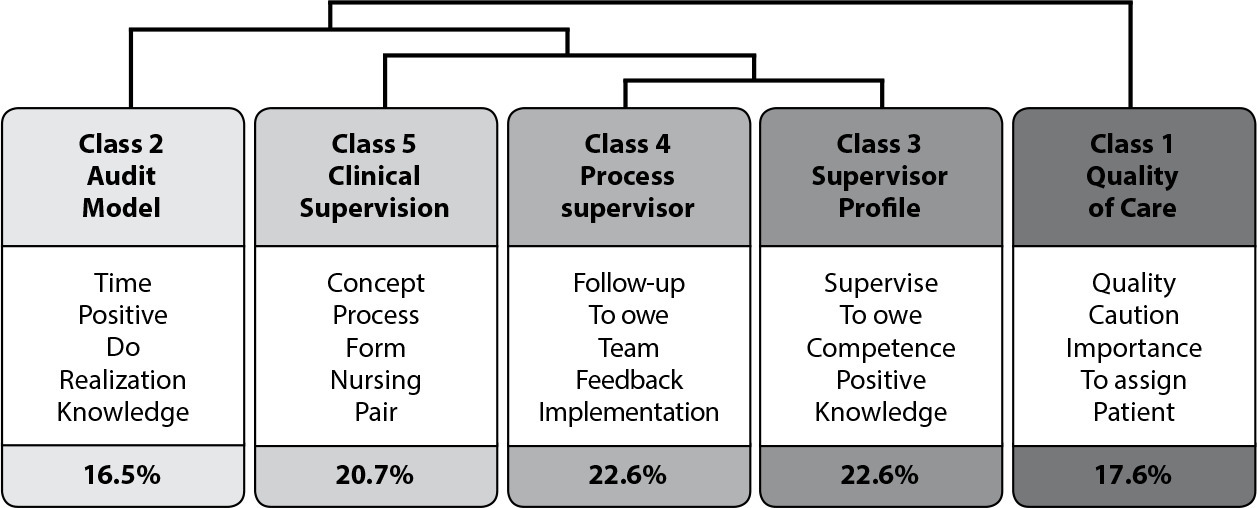
-
REVIEW08-07-2023
Early diagnosis of HIV/aids infection: concept analysis
Revista Brasileira de Enfermagem. 2023;76(3):e20220565
Abstract
REVIEWEarly diagnosis of HIV/aids infection: concept analysis
Revista Brasileira de Enfermagem. 2023;76(3):e20220565
DOI 10.1590/0034-7167-2022-0565
Views0See moreABSTRACT
Objectives:
to analyze the concept of “early diagnosis of HIV/Aids infection” in light of Walker and Avant’s conceptual analysis model.
Methods:
concept analysis study based on the framework proposed by Walker and Avant, instrumented by a scoping review conducted in April 2022, following the recommendations of the Joanna Briggs Institute and checklist Preferred Reporting Items for Systematic reviews and Meta-Analyses extension for Scoping Reviews. The search was made in eight data sources, obtaining sixteen articles.
Results:
the study found homosexual intercourses, early examination, anti-HIV antibodies, CD4 count, and sexually transmitted infection as the main attributes of the concept. As antecedents: information, risky behavior, unprotected sexual relations, prevention, and access to the service. As main consequences: antiretroviral treatment, seroconversion, transmission, and consultations.
Final Considerations:
the study approached the circumstantial situations of the theme, its attributes, antecedents, and consequences, qualifying the work process based on knowledge of nursing practice.
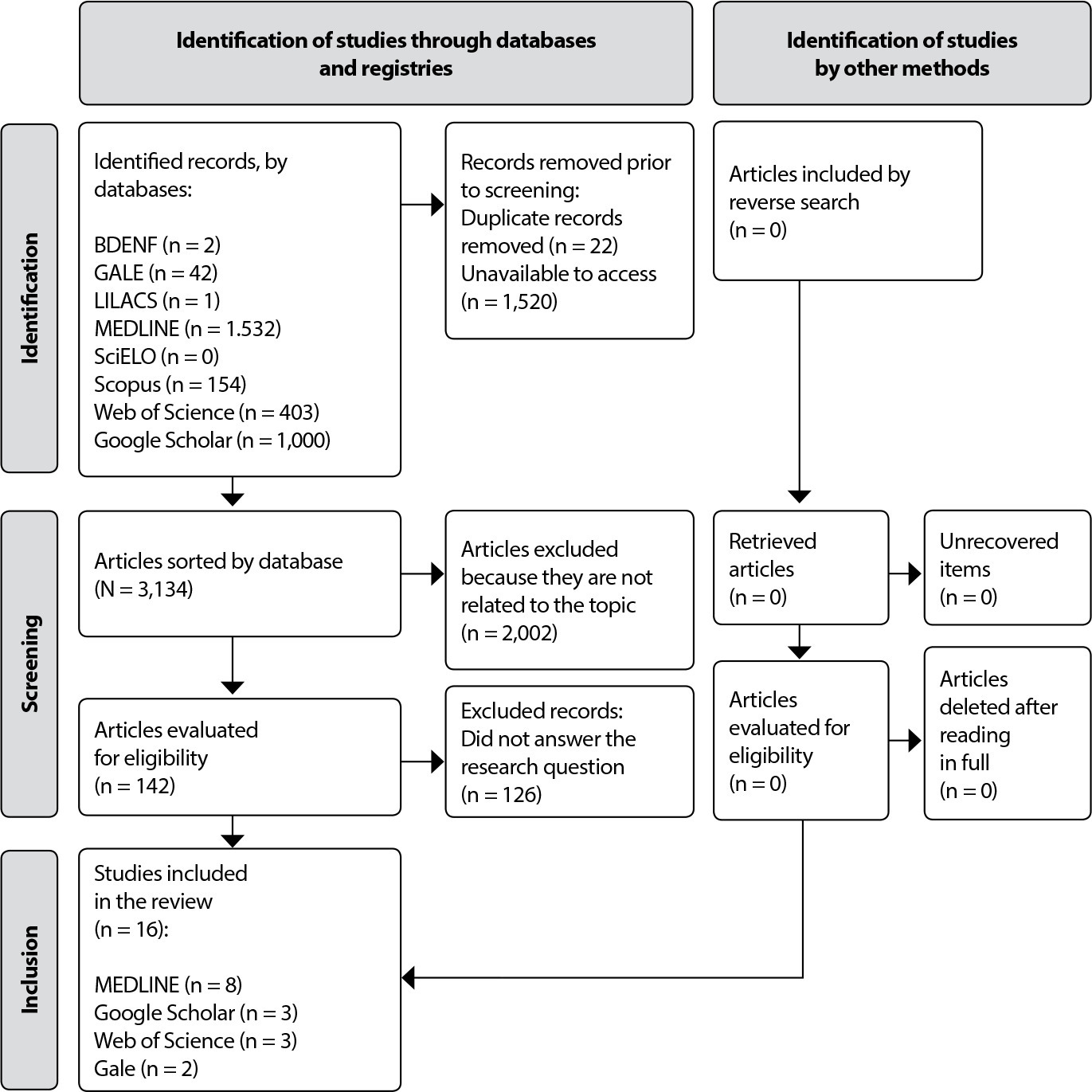
-
ORIGINAL ARTICLE08-07-2023
Workload assessment: cross-cultural adaptation, content validity and instrument reliability
Revista Brasileira de Enfermagem. 2023;76(3):e20220556
Abstract
ORIGINAL ARTICLEWorkload assessment: cross-cultural adaptation, content validity and instrument reliability
Revista Brasileira de Enfermagem. 2023;76(3):e20220556
DOI 10.1590/0034-7167-2022-0556
Views0See moreABSTRACT
Objectives:
to adapt, validate the content and assess the reliability of the instrument National Aeronautics and Space Administration – Task Load Index, translated into Brazilian Portuguese.
Methods:
a methodological study, divided into five steps: translation; synthesis; back-translation; assessment of the Portuguese version by an expert committee; pre-test and content validity of the final version by health professionals working in inpatient units. The Content Validity Index (CVI) (minimum 0.80) and Cronbach’s alpha (minimum 0.70) were calculated.
Results:
in the first round, in the agreement analysis of the translated version, three items did not reach the minimum CVI value. It was decided to remove the statement. The instrument title and items “performance” and “effort” were changed. There was consensus and approval of the final version in the pre-test step.
Conclusions:
the NASA Task Load Index instrument, adapted to Brazilian Portuguese, presents reliability and content validity evidence.
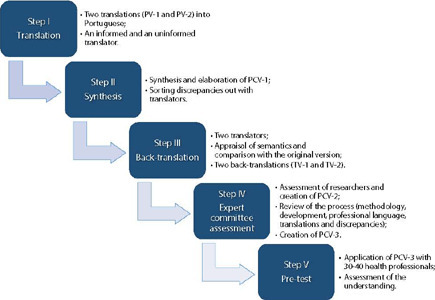
-
REVIEW08-07-2023
Instruments for assessing foot self-care of people with diabetes: a scoping review
Revista Brasileira de Enfermagem. 2023;76(3):e20220555
Abstract
REVIEWInstruments for assessing foot self-care of people with diabetes: a scoping review
Revista Brasileira de Enfermagem. 2023;76(3):e20220555
DOI 10.1590/0034-7167-2022-0555
Views0See moreABSTRACT
Objectives:
to map, in the world literature, instruments for assessing foot self-care of people with diabetes.
Methods:
a scoping review in Scopus by Elsevier, MEDLINE via PubMed, LILACS, SciELO databases and gray literature, using the controlled words diabetic foot, self care, questionnaire. Search was carried out in February and March 2021, according to JBI recommendations and PRISMA-ScR extension.
Results:
fifteen studies made up the review, 14 articles and one thesis, published between 2000 and 2020. 16 instruments were identified: five with an emphasis on general self-care and 11 on foot self-care. Inspection, hygiene, washing and drying between the toes, lotion application and use of proper shoes and socks were the main self-care measures presented.
Final Considerations:
foot self-care is assessed by knowledge, social support and frequency with which measures are being put into practice, encouraging professional practice.
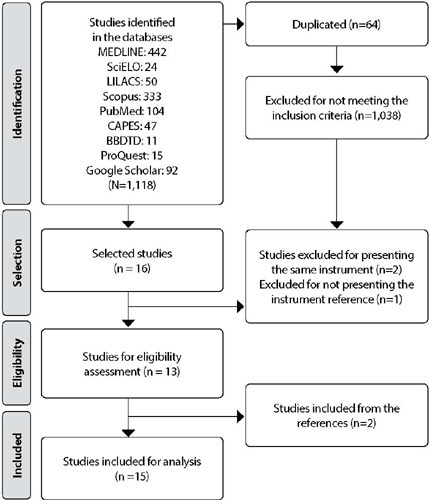
-
ORIGINAL ARTICLE08-07-2023
“Educational Material on HIV”: validity of health educational technology for people living with HIV
Revista Brasileira de Enfermagem. 2023;76(3):e20220549
Abstract
ORIGINAL ARTICLE“Educational Material on HIV”: validity of health educational technology for people living with HIV
Revista Brasileira de Enfermagem. 2023;76(3):e20220549
DOI 10.1590/0034-7167-2022-0549
Views0See moreABSTRACT
Objectives:
to validate the educational technology “Educational Material on HIV” (INPI – BR 10 2020 003765 0).
Methods:
a methodological study with 39 expert judges in HIV/AIDS, using a 5-point Likert scale for assessment. Data were tabulated, processed and analyzed through descriptive analysis. Cronbach’s alpha and McDonald’s omega tests were performed to analyze internal consistency, and the Intraclass Correlation Coefficient, for reliability. Agreement was established by a Level Content Validity Index greater than 0.90.
Results:
the assessment instrument showed high internal consistency (Cronbach’s alpha of 0.89; McDonald’s omega of 0.91) with reliable values. Based on the Intraclass Correlation Coefficient, judges’ answers showed acceptable reliability, mean score 0.89 (p<0.001). Agreement among judges was greater than 0.90 in the three assessed dimensions (objectives, presentation and relevance).
Conclusions:
the technology was considered a qualified and adequate tool by the judges regarding its objectives, presentation and relevance.
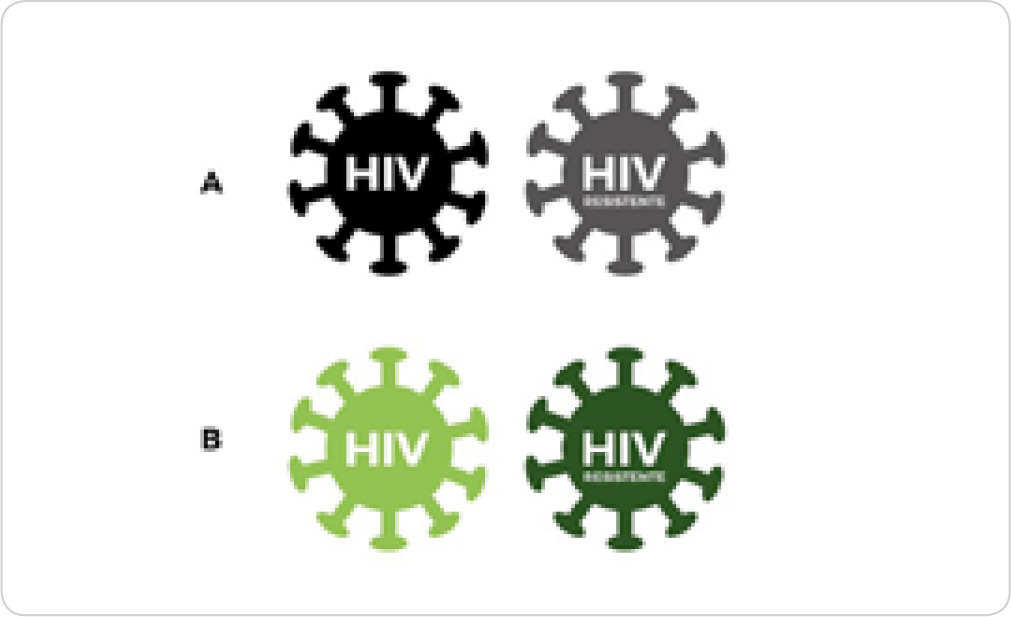
-
ORIGINAL ARTICLE08-07-2023
Content validity of the Post-Stroke Guidance and Follow-up Booklet
Revista Brasileira de Enfermagem. 2023;76(3):e20220532
Abstract
ORIGINAL ARTICLEContent validity of the Post-Stroke Guidance and Follow-up Booklet
Revista Brasileira de Enfermagem. 2023;76(3):e20220532
DOI 10.1590/0034-7167-2022-0532
Views0See moreABSTRACT
Objectives:
to provide sources of content validity evidence for the Post-Stroke Guidance and Follow-up Booklet.
Methods:
a quantitative-qualitative approach, using two Delphi method and content analysis rounds. The Educational Content Validation Instrument in Health was sent to 53 independent judges. A Content Validity Index above 0.90 was considered.
Results:
of the 14 nurses who participated, 64.3% have experience with stroke care, 35.7% with primary care and 64.3% with educational material production. In content analysis, judges’ suggestions were stratified into four categories: material conformation, objectivity, accuracy and perception. Spelling changes were made to the images, addition of functionality scale, adequacy of technical terms and language. The Content Validity Index in the second round showed a concordance of 0.97.
Conclusions:
the booklet presented satisfactory content validity sources of evidence.
-
ORIGINAL ARTICLE08-07-2023
Construction and validity of the Interprofessional Communication in Health Scale
Revista Brasileira de Enfermagem. 2023;76(3):e20220483
Abstract
ORIGINAL ARTICLEConstruction and validity of the Interprofessional Communication in Health Scale
Revista Brasileira de Enfermagem. 2023;76(3):e20220483
DOI 10.1590/0034-7167-2022-0483
Views0See moreABSTRACT
Objectives:
to construct and validate the Interprofessional Communication Scale in Health.
Methods:
a psychometric study was carried out on a sample of 360 nurses from a hospital and university center in central Portugal. Reliability was assessed through internal consistency and construct validity through exploratory and confirmatory factor analysis.
Results:
the Interprofessional Communication in Health Scale, consisting of 27 items, is organized into 3 factors: “Teamwork”, “Conflict management” and “Leadership”, with a total variance of 51.1%. Good internal consistency was obtained, with a Cronbach’s alpha of 0.842, and adequate Goodness of Fit Index model.
Conclusions:
the Interprofessional Communication in Health Scale presents a factorial structure with adequate validity and reliability results, and may constitute a useful self-report instrument in assessing interprofessional communication in health.
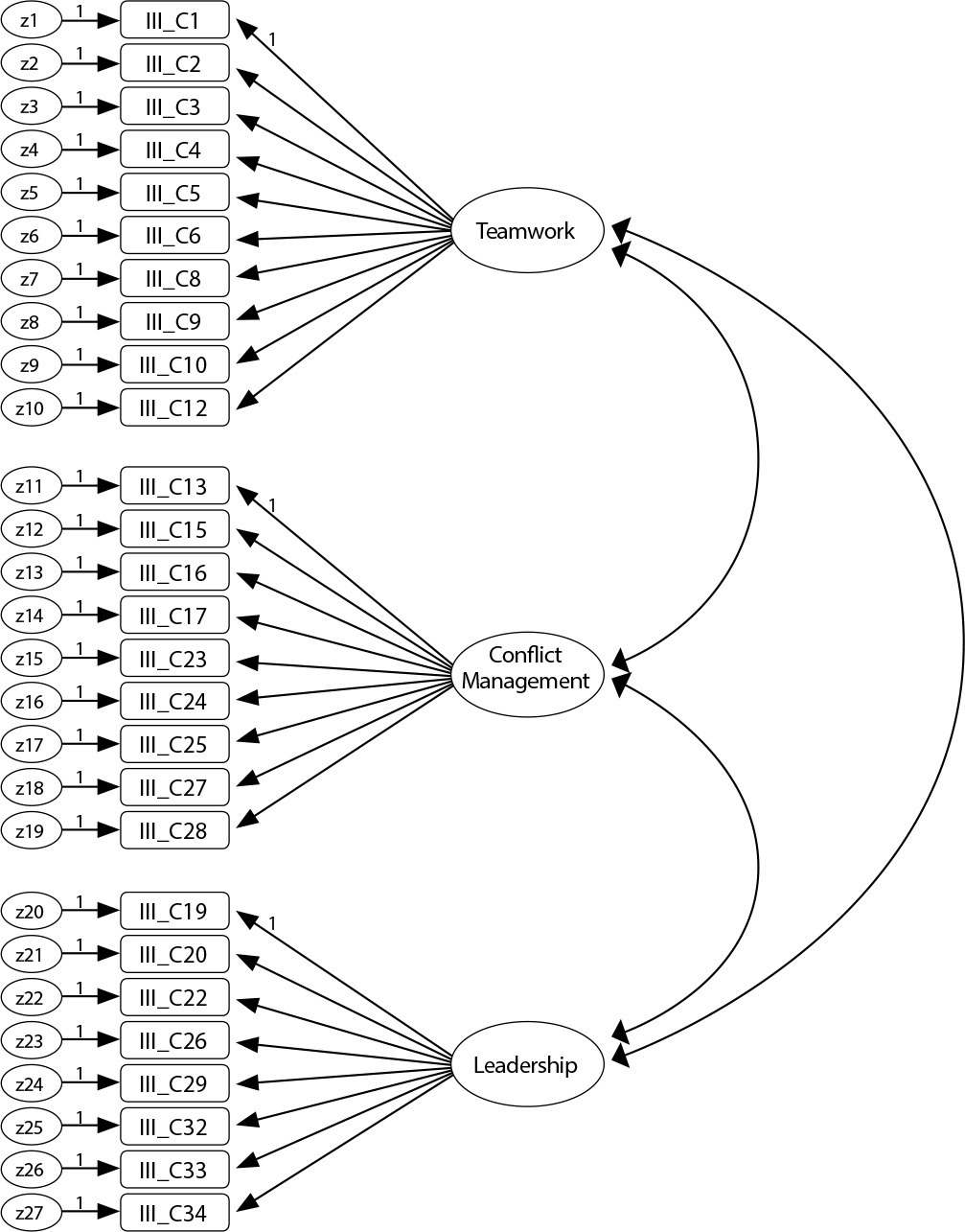
-
ORIGINAL ARTICLE08-07-2023
Systematization of Nursing Care: how did the concept mature?
Revista Brasileira de Enfermagem. 2023;76(3):e20220464
Abstract
ORIGINAL ARTICLESystematization of Nursing Care: how did the concept mature?
Revista Brasileira de Enfermagem. 2023;76(3):e20220464
DOI 10.1590/0034-7167-2022-0464
Views0See moreABSTRACT
Objectives:
to analyze the Systematization of Nursing Care conceptual maturation from the perspective of pragmatic utility.
Methods:
a concept analysis study. The stages were: select the concept; elaborate analytical questions; comprehensively review the literature; and determine concept structural components. Sixty-one documents were analyzed after a search carried out until October 2019.
Results:
four temporal periods of contextual changes have occurred since the emergence of ideas of a systematization in the 1960s. This first lasted until 1990. It was followed by those from 1990 to 2002, from 2002 to 2009 and from 2009 onwards. Partial conceptual maturity was identified, operationalization over the years, based on multiple definitions, and, currently, a concept of Systematization of Nursing Care with managerial and organizational attributes.
Conclusions:
the concept of Systematization of Nursing Care is partially mature, presents multiple definitions, being operationalized in uncertain connections with other concepts.
-
01-01-2016
Health needs and nursing care
Revista Brasileira de Enfermagem. 2016;69(6):1236-1239
Abstract
Health needs and nursing care
Revista Brasileira de Enfermagem. 2016;69(6):1236-1239
DOI 10.1590/0034-7167-2016-0128
Views0See moreABSTRACT
Objective:
to present the concept of needs according to different approaches to discuss the possibility of health care that incorporates a broader view of human vulnerabilities in health services.
Methods:
the arguments are founded on nursing theorists who worked on the construction of frameworks relevant to care, based on needs and on philosophers who show the possibility of identifying the vulnerabilities of human beings, defending art as a therapeutic instrument that can promote health care.
Conclusion:
although care can acquire a new dimension with the introduction of art, according to certain perspectives, philosophical studies on ethics and aesthetics should be resumed to identify human vulnerabilities that can in fact be compensated by sensible understanding of the outer world. To incorporate art in nursing care requires studies from theorists to be recovered, deepening concepts and working on empirical investigations for their adequate use.
-
01-01-2016
Case studies and role play: learning strategies in nursing
Revista Brasileira de Enfermagem. 2016;69(6):1231-1235
Abstract
Case studies and role play: learning strategies in nursing
Revista Brasileira de Enfermagem. 2016;69(6):1231-1235
DOI 10.1590/0034-7167-2016-0277
Views0See moreABSTRACT
Objective:
to report professors’ experience in a public university of Southern region of Brazil using case studies and role play as learning strategies for nursing care of hospitalized adults.
Method:
learning experience report from the Nursing Care of Adults I class of nursing undergraduate course.
Results
the development of case studies and role play considered health care needs from epidemiological profile of chronic noncommunicable diseases morbidity and mortality, nursing as an assisting method, and social aspects of hospitalized individuals. Role play planning was made by creating a stage in laboratory of practices and dialogues comprising students and professors interaction.
Conclusion
case studies and role play encouraged students to active search for learning and brought theory closer to real health care situations.

-
01-01-2016
Politicy of care in the criticism towards gender stereotypes
Revista Brasileira de Enfermagem. 2016;69(6):1223-1230
Abstract
Politicy of care in the criticism towards gender stereotypes
Revista Brasileira de Enfermagem. 2016;69(6):1223-1230
DOI 10.1590/0034-7167-2016-0441
Views0See moreABSTRACT
Objectives:
analyze gender inequalities among Brazilian women in Portugal and in contemporary nursing based on care politicity in the light of gender; disclose oppression of the female produced by the stereotypes that look upon women as natural caregivers; point out politicity to deconstruct gender stereotypes.
Method:
theoretical reflection with narrative review of literature to analyze classic references in the feminist epistemology combined with the care politicity thesis.
Results:
the similarities between the stereotypes of the Brazilian Eves and the Portuguese Maries as either the sexualized or sanctified nurse are inserted in the Jewish-Christian moral genealogy that reaffirms the subservience of the female to the male.
Conclusion:
by attaching priority to care that needs non-care to expand the possibilities of care giving, the theoretical assumption of politicy of care can contribute to subvert the stereotypical images of Brazilian women in Portuguese lands and in contemporary nursing.
-
01-01-2016
Strategies for thirst relief: integrative literature review
Revista Brasileira de Enfermagem. 2016;69(6):1215-1222
Abstract
Strategies for thirst relief: integrative literature review
Revista Brasileira de Enfermagem. 2016;69(6):1215-1222
DOI 10.1590/0034-7167-2016-0317
Views0See moreABSTRACT
Objective:
to analyze the strategies used to relieve the thirst of hospitalized patients.
Method:
an integrative review, for which the databases PubMed, LILACS, CINAHL and the group of references organized by the Group for Study and Research of Thirst were selected for the search of primary studies, with the keywords: thirst, ice, cold, intervention, nursing care, artificial saliva.
Results:
the review sample was composed of ten primary studies. The strategies found were: low temperature using frozen gauze, ice chips, and cold water, menthol associated with cold strategies, chewing gum, acupressure, and the use of a thin straw, substitute saliva, and early fluid ingestion.
Conclusion:
the temperature was presented as a predominant and effective strategy to relieve the thirst for surgical patients in intensive care and hemodialysis treatment.

-
01-01-2016
Care of the self and power relations: female nurses taking care of other women
Revista Brasileira de Enfermagem. 2016;69(6):1204-1214
Abstract
Care of the self and power relations: female nurses taking care of other women
Revista Brasileira de Enfermagem. 2016;69(6):1204-1214
DOI 10.1590/0034-7167-2016-0021
Views0See moreABSTRACT
Objective:
to analyze the care of self of female nurses and the power relations established by them in the care of other women.
Method:
integrative review of literature published between 2005 and 2015. There were 25 publications in the sample.
Results:
qualitative state of the art with reference domain of a liberating perspective, based on humanization, autonomy and empowerment as a risk reduction strategy in the practice of care to women. The findings suggest solidified power relations among female nurses and women, focused on professional domain concentrated on nurse education under the patriarchal and society’s normalization discourse. Some studies consider the importance of understanding power in a capillary way, operating on the bodies of individuals.
Conclusion:
there is little discussion about the care of self of nurses and the effects on their professional practice, indicating gaps in knowledge in this field.

-
01-01-2016
Nursing competencies in promoting the health of individuals with chronic diseases
Revista Brasileira de Enfermagem. 2016;69(6):1195-1203
Abstract
Nursing competencies in promoting the health of individuals with chronic diseases
Revista Brasileira de Enfermagem. 2016;69(6):1195-1203
DOI 10.1590/0034-7167-2016-0312
Views0See moreABSTRACT
Objective:
to identify nurse’s competencies related to health promotion of individuals with chronic cardiac disease, in the light of the Galway consensus.
Method:
integrative literature review was conducted to search for studies published between 2010 and 2014 in the databases LILACS, BDENF, IBECS; and PubMed in February 2015. The 21 included studies were analyzed according to the eight domains of competence: Catalyzing change, Leadership, Evaluation, Planning, Implementation, Assessment, Advocacy and Partnerships.
Results:
all domains of competence were included in the nursing interventions in health promotion of chronic cardiac patients, and the Planning and Evaluation were the most evident competences.
Conclusion:
the results of this research highlighted the nurse as an agent capable of operating care management, in order to improve coordination of the latter with work and education and, thus, the health care of the population.

-
01-01-2016
Assisted therapy with dogs in pediatric oncology: relatives’ and nurses’ perceptions
Revista Brasileira de Enfermagem. 2016;69(6):1188-1194
Abstract
Assisted therapy with dogs in pediatric oncology: relatives’ and nurses’ perceptions
Revista Brasileira de Enfermagem. 2016;69(6):1188-1194
DOI 10.1590/0034-7167-2016-0243
Views0See moreABSTRACT
Objective:
to understand the perception of nursing staff professionals and legal guardians of children and adolescents with cancer regarding Assisted Therapy with dogs.
Method:
qualitative study based on participant observation conducted with 16 participants in a reference hospital of child cancer. We applied an in-depth interview and interpreted the data according to a content analysis technique.
Results:
the practice is admittedly beneficial to participants despite the fact they do not understand its true objectives and therapeutic applications. Participants only associate it with something distracting and entertaining without realizing the occurrence of a more complex process behind it, which comprises changes besides the emotional ones (more easily perceived).
Conclusion:
the perceptions of participants reinforce recommendations that can be applied in the hospital environment, also showing that the therapy in question can become an effective technology to promote the health of children and adolescents with cancer.
-
01-01-2016
Socio-environmental approach in nursing: focusing on rural labor and the use of pesticides
Revista Brasileira de Enfermagem. 2016;69(6):1179-1187
Abstract
Socio-environmental approach in nursing: focusing on rural labor and the use of pesticides
Revista Brasileira de Enfermagem. 2016;69(6):1179-1187
DOI 10.1590/0034-7167-2016-0364
Views0See moreABSTRACT
Objective:
to apply a socio-environmental approach to the relationship between human health and rural labor through a link verification/association between health disorders and the use of pesticides.
Method:
this is a quantitative, cross-sectional, observational and exploratory study with 331 inhabitants of two cities in the state of Rio Grande do Sul, Brazil. Data analysis was conducted by Poisson regression.
Results:
reported health disorders included: mental (62.2%); circulatory (49.8%); dermatologic (45%); respiratory (41%); and gastric (36.2%). Workers who apply pesticides showed a 90% higher prevalence of dermatological alterations when compared to those who did not.
Conclusion:
the socio-environmental approach, comprising elements of the rural environment, of workers, and of the use of pesticides in the work process in connection/association with potential health disorders has shown that rural workers who apply pesticides present a higher prevalence of dermatological alterations.

Search
Search in:
Nuvem de Tags
Adolescente (85) Atenção Primária à Saúde (239) COVID-19 (91) Criança (91) Cuidados de Enfermagem (269) Educação em Enfermagem (151) Educação em Saúde (139) Enfermagem (930) Enfermagem Pediátrica (86) Estudantes de Enfermagem (77) Estudos de Validação (131) Família (87) Idoso (208) Promoção da Saúde (99) Qualidade de Vida (104) Saúde do Trabalhador (86) Saúde Mental (145) Saúde Pública (82) Segurança do Paciente (150) Tecnologia Educacional (100)



